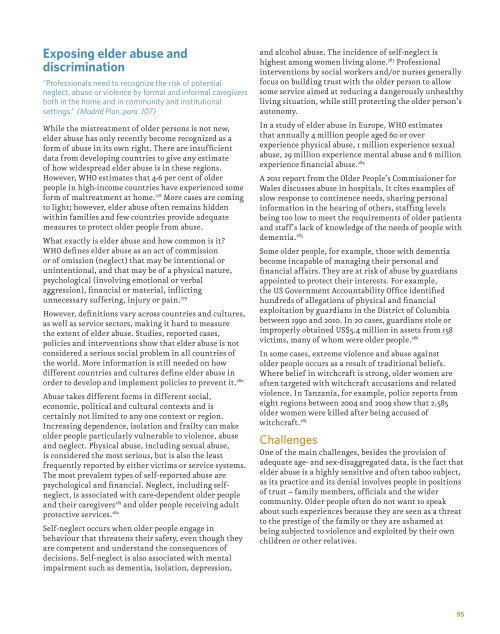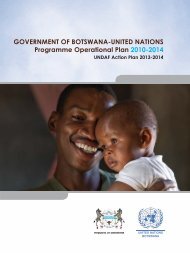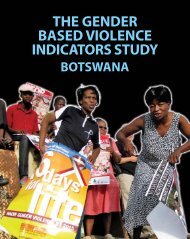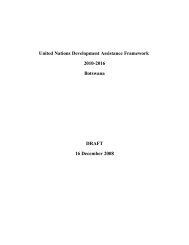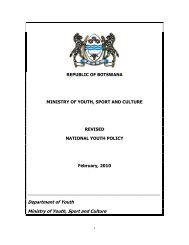Ageing in the Twenty-First Century: - HelpAge International
Ageing in the Twenty-First Century: - HelpAge International
Ageing in the Twenty-First Century: - HelpAge International
Create successful ePaper yourself
Turn your PDF publications into a flip-book with our unique Google optimized e-Paper software.
Expos<strong>in</strong>g elder abuse and<br />
discrim<strong>in</strong>ation<br />
“Professionals need to recognize <strong>the</strong> risk of potential<br />
neglect, abuse or violence by formal and <strong>in</strong>formal caregivers<br />
both <strong>in</strong> <strong>the</strong> home and <strong>in</strong> community and <strong>in</strong>stitutional<br />
sett<strong>in</strong>gs.” (Madrid Plan, para. 107)<br />
While <strong>the</strong> mistreatment of older persons is not new,<br />
elder abuse has only recently become recognized as a<br />
form of abuse <strong>in</strong> its own right. There are <strong>in</strong>sufficient<br />
data from develop<strong>in</strong>g countries to give any estimate<br />
of how widespread elder abuse is <strong>in</strong> <strong>the</strong>se regions.<br />
However, WHO estimates that 4-6 per cent of older<br />
people <strong>in</strong> high-<strong>in</strong>come countries have experienced some<br />
form of maltreatment at home. 278 More cases are com<strong>in</strong>g<br />
to light; however, elder abuse often rema<strong>in</strong>s hidden<br />
with<strong>in</strong> families and few countries provide adequate<br />
measures to protect older people from abuse.<br />
What exactly is elder abuse and how common is it?<br />
WHO def<strong>in</strong>es elder abuse as an act of commission<br />
or of omission (neglect) that may be <strong>in</strong>tentional or<br />
un<strong>in</strong>tentional, and that may be of a physical nature,<br />
psychological (<strong>in</strong>volv<strong>in</strong>g emotional or verbal<br />
aggression), f<strong>in</strong>ancial or material, <strong>in</strong>flict<strong>in</strong>g<br />
unnecessary suffer<strong>in</strong>g, <strong>in</strong>jury or pa<strong>in</strong>. 279<br />
However, def<strong>in</strong>itions vary across countries and cultures,<br />
as well as service sectors, mak<strong>in</strong>g it hard to measure<br />
<strong>the</strong> extent of elder abuse. Studies, reported cases,<br />
policies and <strong>in</strong>terventions show that elder abuse is not<br />
considered a serious social problem <strong>in</strong> all countries of<br />
<strong>the</strong> world. More <strong>in</strong>formation is still needed on how<br />
different countries and cultures def<strong>in</strong>e elder abuse <strong>in</strong><br />
order to develop and implement policies to prevent it. 280<br />
Abuse takes different forms <strong>in</strong> different social,<br />
economic, political and cultural contexts and is<br />
certa<strong>in</strong>ly not limited to any one context or region.<br />
Increas<strong>in</strong>g dependence, isolation and frailty can make<br />
older people particularly vulnerable to violence, abuse<br />
and neglect. Physical abuse, <strong>in</strong>clud<strong>in</strong>g sexual abuse,<br />
is considered <strong>the</strong> most serious, but is also <strong>the</strong> least<br />
frequently reported by ei<strong>the</strong>r victims or service systems.<br />
The most prevalent types of self-reported abuse are<br />
psychological and f<strong>in</strong>ancial. Neglect, <strong>in</strong>clud<strong>in</strong>g selfneglect,<br />
is associated with care-dependent older people<br />
and <strong>the</strong>ir caregivers 281 and older people receiv<strong>in</strong>g adult<br />
protective services. 282<br />
Self-neglect occurs when older people engage <strong>in</strong><br />
behaviour that threatens <strong>the</strong>ir safety, even though <strong>the</strong>y<br />
are competent and understand <strong>the</strong> consequences of<br />
decisions. Self-neglect is also associated with mental<br />
impairment such as dementia, isolation, depression,<br />
and alcohol abuse. The <strong>in</strong>cidence of self-neglect is<br />
highest among women liv<strong>in</strong>g alone. 283 Professional<br />
<strong>in</strong>terventions by social workers and/or nurses generally<br />
focus on build<strong>in</strong>g trust with <strong>the</strong> older person to allow<br />
some service aimed at reduc<strong>in</strong>g a dangerously unhealthy<br />
liv<strong>in</strong>g situation, while still protect<strong>in</strong>g <strong>the</strong> older person’s<br />
autonomy.<br />
In a study of elder abuse <strong>in</strong> Europe, WHO estimates<br />
that annually 4 million people aged 60 or over<br />
experience physical abuse, 1 million experience sexual<br />
abuse, 29 million experience mental abuse and 6 million<br />
experience f<strong>in</strong>ancial abuse. 284<br />
A 2011 report from <strong>the</strong> Older People’s Commissioner for<br />
Wales discusses abuse <strong>in</strong> hospitals. It cites examples of<br />
slow response to cont<strong>in</strong>ence needs, shar<strong>in</strong>g personal<br />
<strong>in</strong>formation <strong>in</strong> <strong>the</strong> hear<strong>in</strong>g of o<strong>the</strong>rs, staff<strong>in</strong>g levels<br />
be<strong>in</strong>g too low to meet <strong>the</strong> requirements of older patients<br />
and staff’s lack of knowledge of <strong>the</strong> needs of people with<br />
dementia. 285<br />
Some older people, for example, those with dementia<br />
become <strong>in</strong>capable of manag<strong>in</strong>g <strong>the</strong>ir personal and<br />
f<strong>in</strong>ancial affairs. They are at risk of abuse by guardians<br />
appo<strong>in</strong>ted to protect <strong>the</strong>ir <strong>in</strong>terests. For example,<br />
<strong>the</strong> US Government Accountability Office identified<br />
hundreds of allegations of physical and f<strong>in</strong>ancial<br />
exploitation by guardians <strong>in</strong> <strong>the</strong> District of Columbia<br />
between 1990 and 2010. In 20 cases, guardians stole or<br />
improperly obta<strong>in</strong>ed US$5.4 million <strong>in</strong> assets from 158<br />
victims, many of whom were older people. 286<br />
In some cases, extreme violence and abuse aga<strong>in</strong>st<br />
older people occurs as a result of traditional beliefs.<br />
Where belief <strong>in</strong> witchcraft is strong, older women are<br />
often targeted with witchcraft accusations and related<br />
violence. In Tanzania, for example, police reports from<br />
eight regions between 2004 and 2009 show that 2,585<br />
older women were killed after be<strong>in</strong>g accused of<br />
witchcraft. 287<br />
Challenges<br />
One of <strong>the</strong> ma<strong>in</strong> challenges, besides <strong>the</strong> provision of<br />
adequate age- and sex-disaggregated data, is <strong>the</strong> fact that<br />
elder abuse is a highly sensitive and often taboo subject,<br />
as its practice and its denial <strong>in</strong>volves people <strong>in</strong> positions<br />
of trust – family members, officials and <strong>the</strong> wider<br />
community. Older people often do not want to speak<br />
about such experiences because <strong>the</strong>y are seen as a threat<br />
to <strong>the</strong> prestige of <strong>the</strong> family or <strong>the</strong>y are ashamed at<br />
be<strong>in</strong>g subjected to violence and exploited by <strong>the</strong>ir own<br />
children or o<strong>the</strong>r relatives.<br />
95


